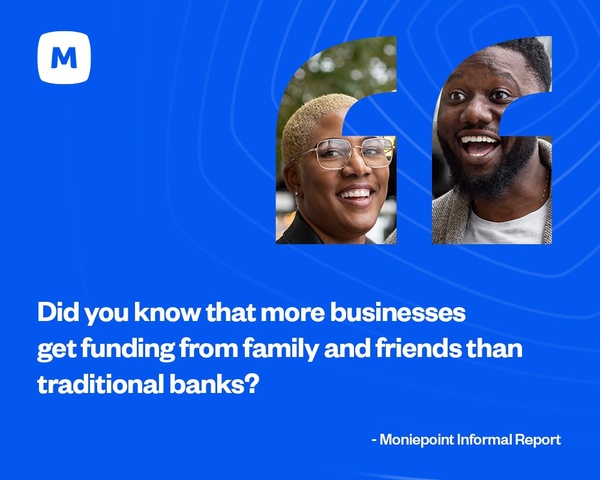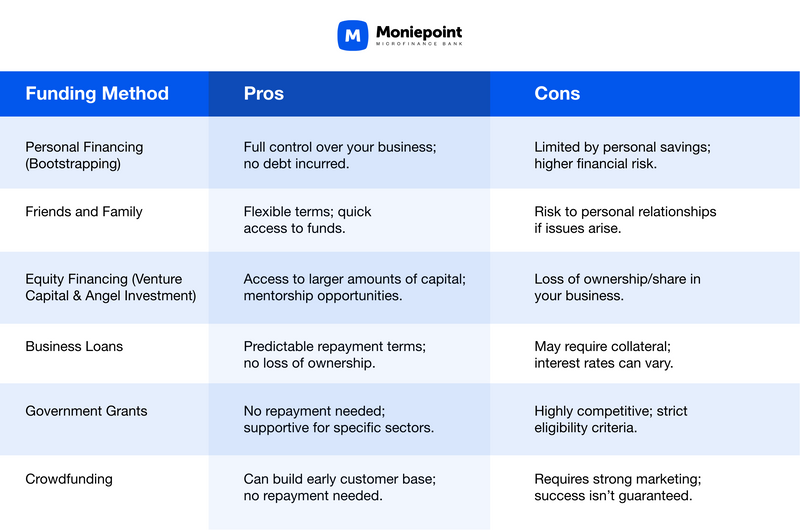It all begins with a 'light-bulb' idea for a solution that meets customers' needs. A business is born and sells products or services either in a traditional brick-and-mortar manner or digitally.
However, as brilliant as any business is, it requires money to grow and sustain itself. Unfortunately, this is hard to come by, especially for small businesses in developing countries like Nigeria.

In fact, the International Finance Corporation (IFC) reveals that 40% of small and medium enterprises (MSMEs) in developing countries have unmet financing needs of $5.2 trillion yearly.
Whether you wish to raise business funds from your friends and family or via a small business loan, youre in the right place.
Understanding Your Business Needs
Are you in the early stages of your business, or have you been operating for a while and are now considering an expansion? You should be clear about your fundraising purpose.
Draft your necessities into the 'wait' and the 'need' lists; this will help you figure out your business's necessities. Additionally, it'll enable you to avoid unnecessary debt and, on the flip side, underestimation.
A major tip to remember is to properly analyse your cash flow and figure out how much money you'll require for the next milestone.

Some typical business expenses and questions concerning them to consider before seeking funding include;
Payroll: Figure out how many employees you plan to hire, how much you aim to pay them, and how many you may need to start making a profit.
Licensing, taxes, and permits: As a business owner, you need to understand the various permits, licenses, and taxes you must pay to start or expand your business and budget accordingly.'
Insurance: Run your business smart by insuring your employees' health, business amenities, etc., against unforeseen disasters.
Inventory: Analyse your inventory and make proper plans to invest more if it doesn't meet future expectations.
Running advertisements and website maintenance: To make a profit, you need to be seen, and an effective way to do so is to run paid social media ads and have an operational website. Make the right budget and fund accordingly.
Rent, Equipment, and Utilities: If you're operating a brick-and-mortar business, you'll need to budget for the rent, machinery, and other equipment to run efficiently. Ensure you properly understand the commercial lease or rent terms before signing a contract.
Types of Business Funding
There are two types of funding options you can seek out for your business they include;
1. Zero-debt financing: Here, you invest in your business through your savings or investments from people, which you receive in exchange for non-monetary incentives such as equity.
This type of funding is advisable if you are just starting out a new business idea and you wish to avoid taking debts you might not be able to handle.
2. Debt-financing: Here, you take a monetary loan with a promise to pay it back with interest. It is usually advisable to have a clear business plan that comprises competitor analysis, market research, financial projections, and revenue generation.
6 Ways to Get Funding for Your Business
1. Personal Financing or Bootstrapping
Funding: Zero-debt financing
When starting a business, this option is usually the first step many business owners take, as this allows them to avoid external debt. Here, you can fund your business with your funds or savings until your business becomes profitable.
An advantage of this option is that you can avoid frequent debt financing and stay safe should the business hit some hurdles. Ultimately, this option is ideal for small businesses just kicking off; however, if you wish to expand, you should consider taking on external loans.
2. Friends and Family
Funding: Zero-debt financing
Did you know that more businesses get funding by borrowing money from family and friends than from traditional banks? Most startup businesses use this funding approach. However, it is better to do it with transparency and accountability.
When asking friends and family for funding support, ensure you are honest about your goals, vision, and financial projections. While Unlcle Bolaji might want to throw in a couple of nairas, it's essential that you treat each friend and family member like an external investor with a certain level of professionalism.
In order to avoid creating rifts in relations in the future, ensure that you come to a formal agreement on what type of funding they are giving you. Is it a repayable loan, an investment, or some good-wish cash? Clearly outline the contract and use the money wisely.

3. Equity Financing, such as Venture Capital and Angel investment
Funding: Zero-debt financing
The two most common equity financing methods are venture capital and angel investing. In this case, you give individuals or firms an ownership share in your business in return for the capital they offer.
Let's break it down a bit - Angel investing is easier for upcoming entrepreneurs as the angel investors are usually rich individuals or firms who tend to focus more on smaller investments.
Alternatively, venture capital firms look to invest in fast-rising startups with a high potential to be lucrative businesses. Venture capitalists are mostly attracted to technology-driven sectors like communications, biotechnology, or information technology.
Overall, no matter the type of investment option you choose, ensure that you properly spell out the conditions to avoid misunderstandings in the future.
4. Business Loans
Funding: Debt-financing
Most small businesses or startup ventures find receiving loans from traditional financial institutions such as commercial banks difficult. This is where loans from micro-finance banks such as Moniepoint MFB come in.
At Moniepoint, we gain insight into the financial history of businesses that use our services. This, along with a credit assessment system explicitly built for informal businesses, means you can access working capital loans in a way that matches your needs.
5. Government Grants
Funding: Zero-debt financing
The Government, through bodies like the Small and Medium Enterprises Development Agency of Nigeria (SMEDAN), offers various types of non-repayable business grants. They often do this for market expansion, development, research, or environmental purposes.
To qualify for a government grant as a business owner, you'll have to submit a business plan, application forms as required, owners' background experience, and lots more.
While it is a free and easily accessible opportunity for funding your business, you'll have to be patient as the timeline for application is broad to accommodate other business entries.
6. Crowdfunding
As a business owner who has gathered a dedicated audience and wishes to expand to a larger workspace or invest in more inventories, you can consider crowdfunding.
This option involves a large number of people, each raising a small amount of money to support a particular individual or business goal. The common types of crowdfunding include;
Equity crowdfunding: Here, your donors will receive equity in your business as they anticipate future returns.
Rewards-based crowdfunding: In this instance, your supporters donate money to your business in exchange for a non-financial reward. Such rewards can be exclusive access to events and first-user access to your product.
Debt-based crowdfunding: In this case, supporters give you a loan, which you will pay back on a spelt-out schedule with interest.

Crowdfunding platforms are a good opportunity for small business owners to raise significant amounts of funds; however, you need to do your market research and have a compelling pitch.

How Moniepoint MFB Helps You to Fund Your Small Business
At Moniepoint, we are dedicated to understanding small businesses' need for funding. This is why we especially understudy the businesses that use our business banking platforms consistently to better provide funding advice and loans.
Unlike traditional banks, which have stricter requirements that may be difficult for small businesses to meet, Moniepoint has a straightforward credit access process.
Simply sign up for the Moniepoint Business Banking App to qualify for microloans that enable you to reach your business dreams.
FAQs about Moniepoint Business Loans.
1. What type of loans does Moniepoint offer?
We currently offer business loans only. Our business loans will comprise working capital, overdrafts, and more products soon.
2. Who is eligible to apply for a business loan?
Business owners who have had an active Moniepoint business account for at least six weeks and use it consistently for all their business transactions are eligible.
3. How can I apply for Moniepoint business loans?
You can apply online through our website or mobile app.
4. What documents are required for a Moniepoint Business loan application?
You don't have to submit many documents, just a CAC document or Shop Rent Receipt( if your business verification fails).
5. What is the maximum amount I can borrow from Moniepoint Loans?
The maximum loan amount depends on your business type and creditworthiness. The specific limits will be provided during the application process.
6. What is the interest rate on loans?
Our Working Capital and Overdraft products have varying interest rates.
7. What is the loan tenure?
Depending on the loan product, loan tenures range from 12 to 24 weeks. Specific terms can be discussed during the application process.
8. Are there any fees associated with the loan?
Yes, there are just management fees you'll have to pay.
9. How long does it take to process a loan application?
Loan processing time takes 24 - 72 hours or less sometimes.


